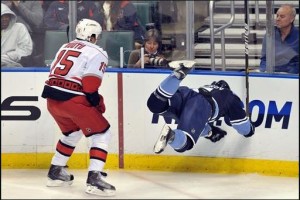There has been a lot of concern lately about concussions suffered all levels of sports competition. Some research exists that repetitive blows to the head can result in accelerated thinning of the cortex: a marker of possible compromised cytoarchitectonic integrity. This recent study published in the Journal of Pediatrics by the University of Vermont’s Dr. Jim Hudziak and coworkers examines the cortical thickness of ice hockey players as it related to a history of concussion and post-concussive symptoms.
The subjects for this study were 29 healthy male hockey players between the ages of 14 and 23, playing on preparatory school or collegiate ice hockey teams. A total of 16 of them reported that they had been diagnosed with a concussion at least once by a medical professional. Five subjects in this sample had been previously diagnosed with ADHD. Current post-concussive symptoms were assessed using the Immediate Post-Concussion Assessment and Cogntive Testing (ImPACT) battery, a computerized assessment that probes a number of domains including memory, processing speed, impulse control, and reaction time. As the name suggests, this instrument is often used soon after a concussive event. Thus, what makes this study more novel is that these players had not recently been concussed and were not currently complaining of symptoms. Levels of behavioral problems were also assessed using the Youth Self Report and the Adult Self-Report instruments. Anatomical MRI scans were obtained with the main variable of interest being the thickness of the cortex in relation to the total score on the ImPACT, after controlling for age.
In terms of results, total concussion symptoms were significantly associated with a thinner cortex in multiple brain regions including the left dorsolateral, ventrolateral, and orbitofrontal cortices and the right dorsomedial cortex, and bilaterally in the tempoparietal cortices. These associations remained even after controlling for levels of presumably baseline behavioral problems. Additional analyses revealed that the brain changes were related especially to symptoms such as difficulty paying attention or remembering, fatigue, or the feeling of being in a mental fog.
Interestingly, a history of concussion by itself was not related to brain thinning overall, although a significant interaction was found between concussion history and age such that in several brain regions, subjects with no history of concussion exhibited age-related thinning in those areas while those with a history of concussion did not. Another intruiging findings was that levels of attention problems, irregardless of cause, were related to reduced thickness in the left anterior cingulate, left ventromedial prefrontal cortex, and left dorsomedial prefrontal cortex.
The authors report that this is the first study to find an association between brain structure and post-concussive symptoms in healthy male athletes. They state that their findings related to brain changes and post-concussive symptoms in the absence of there being a direct link with concussion history suggests that it may be the more numerous and subtle blows that impact the brain more than discrete concussive episodes.
These data will likely add to the growing concern and effort to keep brains safe during sports so that the many benefits of exercise and team sport participation can be realized.
Reference
Albaugh M, et al. Postconcussive Symptoms Are Associated with Cerebral Cortical Thickness in Healthy Collegiate and Preparatory School Ice Hockey Players. J Pediatrics, 2014, epub ahead of print.
Tags: concussion, cortical thickness, hockey, traumatic brain injury


